 There are no shortages of board games about the acquisition of wealth. In fact, one of the most well-known board game in existence, Monopoly, is all about becoming rich by sending your opponents to the poor house. It’s just a shame that Monopoly is such a bad game, as it’s what most people think of when they hear the phrase “board game”.
There are no shortages of board games about the acquisition of wealth. In fact, one of the most well-known board game in existence, Monopoly, is all about becoming rich by sending your opponents to the poor house. It’s just a shame that Monopoly is such a bad game, as it’s what most people think of when they hear the phrase “board game”.
However, publisher Fox Mind is seeking to change that with their latest offering, Get Rich Quick. They developed this game as a way to bridge their players into more modern board games. They hoped to accomplish this by using familiar looking components and easy to learn gameplay. Did they succeed? Let’s find out.
Get Rich Quick is a simultaneous action selection and engine building board game for 3-5 players that takes about 30-40 minutes to play. Get Rich Quick plays best with 4-5 players.
Game Overview:
In Get Rich Quick, players are trying to be the first to acquire 25 fortune points. Each round, players must choose three cards from their identical hand of 7 cards in the hopes of earning money and fortune points. Eventually, they can work their way over to the mall to buy upgrades in the form of special abilities that make their action card plays even stronger. Be the player with the most fortune points at the end of the game you win!
Game Components:
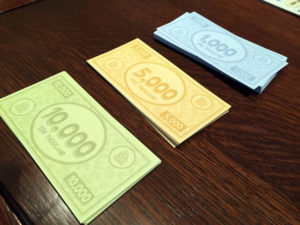
I have mixed feelings on the components of Get Rich Quick. At first glance, they are not that great. First is the paper money, which I hate in games. Only one game has ever done paper money right (Millennium Blades), as paper money is often unwieldy and damages fairly easy. The Fortune Point chips themselves also are a tad flimsily, I would have liked to see them printed on heaver stock. Finally, the game board’s design is a bit of a mess. Things are jumbled all over the place and it can be hard to figure out where everything is (more on that later).
However, I also get what they are trying to do. Get Rich Quick is very much a gateway game. It’s designed to easy people who aren’t really into modern gaming into our beloved hobby. So from the paper money, to the loud graphics on the game board, everything seems to be designed to give new gamers a sense of familiarity. So I get that. And I think they accomplished their mission in that regard. When I tested it with new gamers, they felt right at home. Doesn’t mean I have to like it though. 🙂
How to Play:
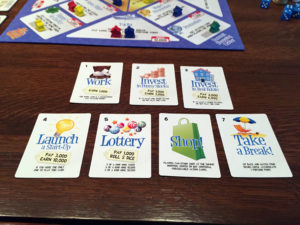
Game play in Get Rich Quick is very simple to pick up. Each player starts the game with an identical hand of 7 cards. Each round, players will simultaneously select 3 cards from their hand to play. Once ready, each player reveals their chosen cards and then they are resolved from lowest to highest.
Card 1 is Work (Earn $1,000) and Card 7 is Take a Break (earn 1 Fortune Point). These are the safe cards that carry no risk.
Cards 2-4 are the risky cards. They cost money to play, but will possibly earn you money back depending on how many other players play the same card.
Card 5 is the Lottery card, a player earns money for rolling 3, 4, 5 of a kind on 5 six-sided dice.
Card 6 is where things get interesting. That allows a player to shop. At the mall, a player can buy a space that will give them a special ability to use during the game. These range from playing a 4th card on your turn, to making the work card more lucrative, to increasing your odds in the lottery, to outright buying chunks of fortune points.
After all 7 cards have been resolved players then pick their cards back up again and choose another three for the next round. Once a player has collected their 25th Fortune Point, the game ends and the player with the most Fortune Points wins.
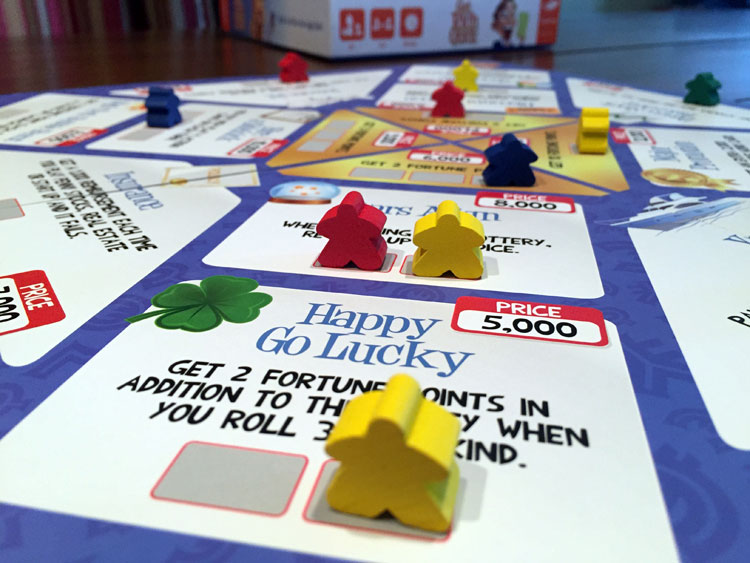
Game Experience:
Overall I think Get Rich Quick is a good game that does many things right. First and foremost, this is definitely a gateway game. From the game’s components, to its gameplay, I think this is a game that you will most likely be playing with family and new gamers. And in that role, I think it works out well. Players are able to pick up the mechanics very quickly and the game has minimal downtime.
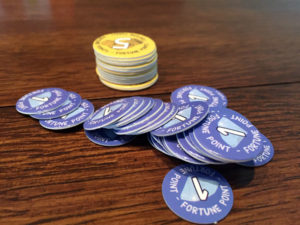
Get Rich Quick does a great job of introducing new gamers to a couple of mechanics that are staples of modern board gaming. The first is the victory point (called the Fortune Point here). While victory points are ubiquitous in todays’ games, it can sometimes be easy to forget that most new gamers might never have played a game using them before.
At first I also thought that Get Rich Quick would teach new players about the worker placement mechanic, but that wasn’t actually true. While they can get a hint of how the mechanic works, thanks to the board, worker placement is not really a part of the game. The big mechanics here are the simultaneous action selection and engine building features.
Speaking of the game board, I’m not a big fan of it. Graphically, it’s a bit of a mess. But the real issue is that the game could have been better served with cards instead of a board. That would allow players to purchase their upgrades, and then place the card them in front themselves as a reminder of their new ability.
Even with its light depth, Get Rich Quick surprisingly offers many hard decisions to make. It’s not always obviously the best cards to choose each round and this is especially true due to the 3 risky cards. You have to try and read your opponents a little bit and so you can guess what they are going to play. This can be easier if you keep an eye on their upgrades. In one of our games, a player bought the “High Tech Bubble Burst” upgrade, so players usually could guess that he’d be trying to launch a startup most of the time.
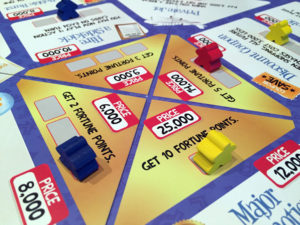
And I also like how there are many paths to victory in Get Rich Quick. Some players will focus on grabbing those fortune point spaces on the board, where others will go for the engine building and get as many card upgrades as possible. I even saw one player focus on the lottery, because hey, who doesn’t like rolling dice. I even sometimes try and play it safe and go for the “Take a break” card every round. Slow and stead wins the race, right?
When it comes to player scaling, I definitely think Get Rich Quick plays better at the higher player counts. For one, as the game is mostly a simultaneous action selection game, there is no worry about increased length with more people. In addition to that, the three risky cards carry more risk with an increased player count. There is a much higher chance of a startup failing when 5 people might be choosing it vs 3.
One of the downfalls with Get Rich Quick though, is its play length. As the game is a fairly simple one, I think this one starts to wear after a while. Once we crossed the 30 minute mark, most players were ready to be at the end. I think the game might have been much better stopping at 20 Fortune Points or less. There just isn’t enough depth here for a 30-45 minute game and repetition will set in. This is especially true if someone pulls out to a commanding lead with their fortune points. It’s rare that I’ve seen someone make a come from behind win in Get Rich Quick.
Final Thoughts:
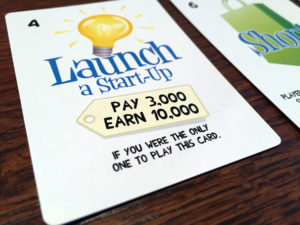
While not perfect, I think Get Rich Quick does achieve its goals of making an accessible gateway game. It does a really good job of introducing new players to both simultaneous action selection, engine building, and just a hint of worker placement.
While most gamers won’t be a fan of the components, I do think they can help new gamers feel more comfortable. Even still, I would have liked to see cards that could be drafted, rather than the clunky game board.
If you are looking for a light board game that can appeal to new gamers and family members, Get Rich Quick is worth a look. While I think it’s probably too light for most gamers, as a family game it’s really solid. Get Rich Quick was a nice offering from Fox Mind, and I look forward to seeing what else they have on the horizon.
If you’d like a copy of Get Rich Quick, you can pick it up for about $30.
Final Score: 3 Stars – A good gateway game that can work well to introduce new gamers to our hobby.
 Hits:
Hits:
• Easy to learn mechanics
• Many paths to victory
• Very little downtime
Misses:
• Play time is a bit longer than it should be
• Not a fan of the graphic design of the game board
• Paper money.























On my first turn of our first play, I did the Lottery and rolled 5 twos! The $30,000 came rolling in, I bought my Jet and maintained what I needed to do along the way to coast to an easy victory. Guess that’s why they call it the lottery.
Why do you say Monopoly is a bad game?
Frankly, because it is. It may have been good in its day, but modern board games have improved up on it in pretty much every way. Just to name a few:
The roll and move mechanic is a bad and unnecessarily random. The player elimination aspect means people might be sitting out of the game while it goes on for another hour or more. The game play is very repetitive, there is almost no variety from turn to turn. Once all of the properties are bought (or even most), the best place for a player to be is in jail, not taking part of the game. If the best way to advance your position in a game is to not actively play it, you know the game is bad.
Seconded. Many board game enthusiasts agree that Monopoly’s design leaves a lot to be desired. Settlers of Catan (now just Catan) implements a lot of the good things about Monopoly (claiming territory, random delivery of resources, negotiation) in a more palatable and often more fair and open way.
Monopoly for adults only is not something that I recommend. However for kids that are not smart enough to play more complicated games it can be fun to play that with adults and even adults can not predict who will win early on often in that game.
Funny thing is that I played Monopoly as a child and today I am no novice to real estate and being landlord. I am not millionaire(on the othe hand we Europeans don’t see our pension as a sum like Americans when that day comes I get pension until I die so that is not a sum we can measure in same way as in America), but if you research google Financial samuraj I belong according to that to the Upper Middle Class (this totally with pension exluded so a bit difficult to compare to USA) and live in Europe.
I am an uncle and look forward to play Monopoly with my brothers children when they are so old that they can play Monopoly.
That said I have nothing against this game Get Rich Quick, but I have not played it yet. As it is not commenting this new game and it was interesting to read your review.
My point was Monopoly is perhaps not meant for those who want more strategy. Monopoly by the way is not always so certain who wins even if someone takes the lead that person might not win if the dice rolls does not go in that players favor.
By the way Settlers of Catan has much more strategy then Monopoly and my win statistics in that has shown that is not for young kids or newbies or purely luck based. Since you all talk about fairly short games I would also recommend 7 Wonders boardgame that is also a light (means not very complicated or a time sink) good game like Settlers of Catan.
While I can’t fault you for enjoying Monopoly, you are welcome to like the games you do, I still don’t think Monopoly is a good game. Even looking for games to play with your kids, there are tons of titles that are much better, and still enjoyable for kids and adults.
Looks to many of the games published by HABA: Rhino Hero, Animal Upon Animal, Adventure Land and Karuba to name a few. There are even kids versions of Carcassonne and Catan.
My point is, there are plenty of options over Monopoly. I don’t enjoy it and think it’s a terrible game. That being said, if you enjoy it, then you should keep playing int.